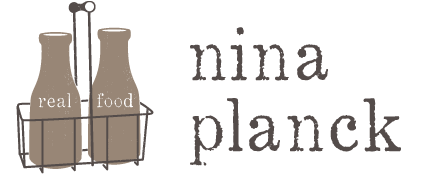The Telegraph: “Savvy shopper: butter versus margarine” by Rose Prince
This article was published in The Telegraph on November 6, 2004.
How to buy good food with peace of mind and a clear conscience. This week, Rose Prince gets to the bottom of the butter debate.
Butter is bad for you and margarine is good: this has been the mantra since hardened vegetable oil spreads have been in mainstream use. But there's now evidence that spreads, margarines and lard-based shortenings contain fats that could be more harmful than saturated fat.
In her forthcoming book, Real Food (Harper Collins, July 2005 ), Nina Planck fights back on behalf of butter. She shows how butter beats low-fat spread in the nutrient quality stakes. But it isn't a simple matter of right or wrong. Whether opting for butter or spread, savvy shoppers face other quandaries – dilemmas that spread across farming practice, animal welfare and the environment.
Which is more healthy, butter or 'spread'?
Spreads contain varying levels of trans fats. Butter – indeed all dairy produce – does not. Trans fats are known to raise the type of cholesterol in the blood that increases the risk of coronary heart disease. The Food Standards Agency admits the effects of these trans fats may be worse than the saturated fat found in both butter and spreads. Trans fats "are harmful and have no known nutritional benefits'', it says.
What's so good about butter?
Butter may contain saturated fat, but it has plenty of natural goodness. Planck's research reveals that butter made from cows' milk contains unique acids that protect the body against viral illness, fight tumors and guard the gut from pathogenic bacteria and the negative effects of microbes and yeasts. Butter is also rich in vitamins A and D, which help the absorption of calcium, benefiting bones and teeth.
